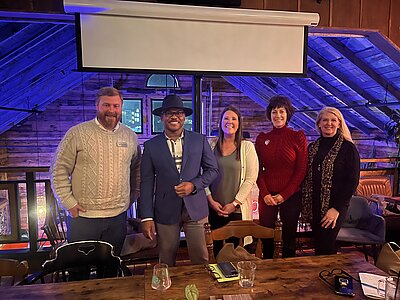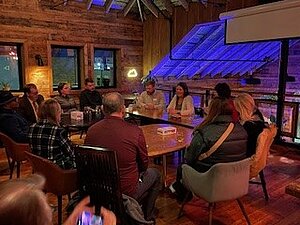Science Café Review: STEM Education Pathway
On Monday, Dec. 4, 2023, the NSF ND-ACES project held a Science Café to discuss K-12 STEM Education and ideas to improve the flow of educators into STEM fields in North Dakota.The ND-ACES: New Discoveries in the Advanced Interface of Computation,Engineering, and Science (ND-ACES) project is funded as part of the National ScienceFoundation’s Established Program to StimulateCompetitive Research (EPSCoR) Research Infrastructure Improvement (RII) Program. This RII Track-1 award provides $20 million over five years to support research-driven improvements in North Dakota related to STEM including cancer related research, education, and outreach. As a part of ND-ACES’s communication programing, two science cafés are held during the year. This was the first Science Café for this academic year. Science Cafés are open to everyone and are an opportunity for scientists and the public to discuss current work and interesting scientific issues.
The session featured four panelists Ryan Summers, associate professor of science education at the University of North Dakota, Denise Jonas, director for career and technical education at Cass County Career and Technical Education Virtual Center, Kristi Leverson, continuing and technical education teacher at West Fargo Public Schools, Karmen Riley, recruitment specialist at Fargo Public Schools. The two-hour discussion explored the routes to STEM education and the difficulties in hiring STEM teachers. Ricot Aladin, from Professional Lunch, took charge of leading the conversation.
The first discussion topic focused on STEM education pathways, with panelists underscoring the value of real-world experiences to create effective teachers. “Individuals aiming to become classroom teachers traditionally complete a 4-year degree, which concludes with a semester-long student teaching internship. This multi-week internship pairs student teachers with experienced teachers in authentic classrooms so they learn how to plan and deliver lessons day-to-day,” Summers explained.
The conversation acknowledged that individuals are pursuing -non-traditional routes into education. The panelists talked about alternative certifications and training options, highlighting the importance of non-traditional pathways in STEM education, and underscoring the potential for a more inclusive approach to preparing individuals for STEM teaching roles. These pathways allow individuals to bring career- and education-related experience into classrooms while helping to address workforce needs.
The second topic of discussion addressed the challenges surrounding STEM teacher recruitment particularly the obstacle of pay disparities. Emphasis was placed on the wage gap between K-12 STEM teachers and those in traditional STEM roles, making it difficult to attract and retain qualified educators. Starting salaries for teachers align with entry-level positions that may attract individuals with bachelor's degrees in STEM fields. The perceived earning potential for educators can significantly influence people's interest in pursuing a career in teaching.
While the issue of pay can be difficult for school districts and tax payers, the discussion proposed alternative incentives that education systems can leverage. Suggestions included initiatives such as loan forgiveness and supplementary opportunities, such as coaching positions, to enhance the overall appeal of STEM teaching roles.
This Science Café served as a collaborative space where four expert panelists and the public could engage in a meaningful discussion, contributing to the ongoing efforts to enhance STEM education in North Dakota. As ND-ACES fulfills its communication requirements, it reinforces the commitment to fostering dialogue and innovation in the pursuit of a stronger STEM education landscape. The next Science Cafe is planned early 2024.
This Science Café was held as part of the requirements of the NSF EPSCoR RII Track-1 Cooperative Agreement OIA #1946202.
Any opinions, findings, and conclusions or recommendations expressed as part of the Science Café are those of the panelists and do not necessarily reflect the views of the National Science Foundation.


